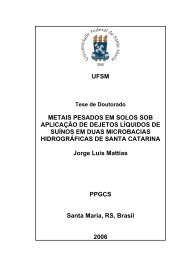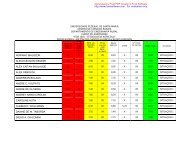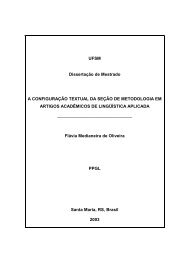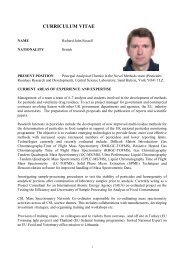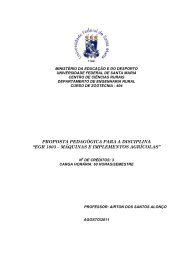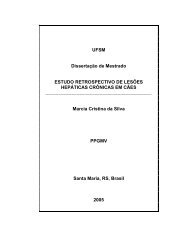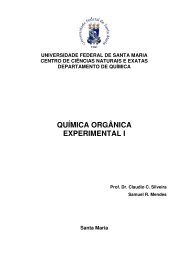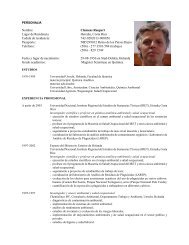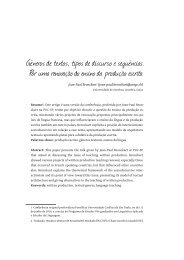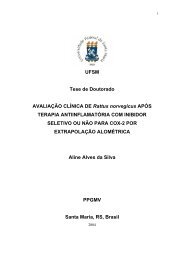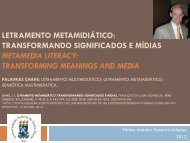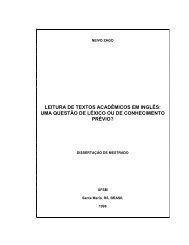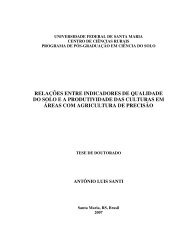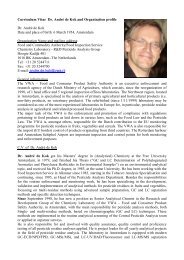- Page 2 and 3:
Esta tese foi julgada adequada e ap
- Page 4 and 5:
ACKNOWLEDGEMENTSI would like to tha
- Page 6 and 7:
RESUMORHETORICAL FEATURES AND DISCI
- Page 8 and 9:
Notes..............................
- Page 10 and 11:
6.2.1 Differences in length of move
- Page 12 and 13:
LIST OF TABLESChapter 5Table 5-1- P
- Page 14:
UNIVERSIDADE FEDERAL DE SANTA CATAR
- Page 17 and 18:
2junior scholars (graduate students
- Page 19 and 20:
4The assumption is that such a desc
- Page 21 and 22:
6genre has been greatly neglected f
- Page 23 and 24:
8genres as commonsensical truth, no
- Page 25 and 26:
10to reflecting about how these tex
- Page 27 and 28:
12Firstly, I will draw on topics re
- Page 29 and 30:
14This study thus seeks to obtain a
- Page 31 and 32:
16For the investigation of generic
- Page 33 and 34:
18of the three selected academic di
- Page 35 and 36:
20The controversy between those who
- Page 37 and 38:
22correct sentences arranged in app
- Page 39 and 40:
24ESL reading, learners that posses
- Page 41 and 42:
26faculty audience’ (ibid.), i.e.
- Page 43 and 44:
28In the remaining of the chapter,
- Page 45 and 46:
30Jamieson is that, after the fall
- Page 47 and 48:
32I found that I could not understa
- Page 49 and 50:
34Further research in English (Wolf
- Page 51 and 52:
362.2.3.1 The Generic Structure Pot
- Page 53 and 54:
38Optional elements, on the other h
- Page 55 and 56:
40This calibration of the contextua
- Page 57 and 58:
42correspond to the above definitio
- Page 59 and 60:
44of the genre. Typification of the
- Page 61 and 62:
46_________________________________
- Page 63 and 64:
48(ibid.) finds that certain lingui
- Page 65 and 66:
50Step 3 - Indicating RA structure:
- Page 67 and 68:
52Dudley-Evans acknowledges the pre
- Page 69 and 70:
542.4.2 Evaluation in book reviewAs
- Page 71 and 72:
56that of establishing the criteria
- Page 73 and 74:
58pertaining to linguistic and disc
- Page 75 and 76:
60‘evaluating’ starts). If, how
- Page 77 and 78:
62there have been studies that have
- Page 79 and 80:
64meaning only in terms of communic
- Page 81 and 82:
66viii ‘The grammatical and/or le
- Page 83 and 84:
68the discussion that follows becau
- Page 85 and 86:
70two weeks, the linguistics editor
- Page 87 and 88:
72to the journal. Less frequently,
- Page 89 and 90:
74different perspectives on the rol
- Page 91 and 92:
76Although their main role is to en
- Page 93 and 94:
78Senior scholars in the field are
- Page 95 and 96:
80manifestation of agreement (1), a
- Page 97 and 98:
82[C]Most journals are expensive in
- Page 99 and 100:
84In general, then, BRs have a far
- Page 101 and 102:
86L, however, expects an in-depth a
- Page 103 and 104:
88[E]We are published by the Americ
- Page 105 and 106:
90to offer the reader his views on
- Page 107 and 108:
923.2.7 Book review formatBook revi
- Page 109 and 110:
94[E]We also identify some particul
- Page 111 and 112:
96main technological and scientific
- Page 113 and 114:
98We do encourage people to make ju
- Page 115 and 116:
100According to the editors, bold o
- Page 117 and 118:
102A second set of conclusions refe
- Page 119 and 120:
104In the following chapter (Chapte
- Page 121 and 122:
1064.1 The corpusThe corpus of the
- Page 123 and 124:
108Probably because they are not th
- Page 125 and 126:
110journals, five (5) economics jou
- Page 127 and 128:
112out by the chemistry BR editor,
- Page 129 and 130:
114was also evidenced in the report
- Page 131 and 132:
116(ibid.:25) while in evaluative p
- Page 133 and 134:
1184.2.3.2 Validity markers, attitu
- Page 135 and 136:
120(i) Other readers -- given their
- Page 137 and 138:
122If terms of praise and blame are
- Page 139 and 140:
124Paradigms” (generalized commit
- Page 141 and 142:
126Swales, 1986) that have emphasiz
- Page 143 and 144:
128The intention here is to find ou
- Page 145 and 146:
130CHAPTER 5TEXT ANALYSIS5.0 Introd
- Page 147 and 148:
132The descriptive move, Outlining
- Page 149 and 150:
134audience, authorship, disciplina
- Page 151 and 152:
136The main portion of the BR is th
- Page 153 and 154:
138in Moves 2 and 3, the reviewer w
- Page 155 and 156:
140referenced reflects this. Nevert
- Page 157 and 158:
142Figure 5-Erro! Apenas o document
- Page 159 and 160:
144Closing: (Sub-function 10B) The
- Page 161 and 162:
146the sentences have a clear discu
- Page 163 and 164:
148Each one of the five sub-functio
- Page 165 and 166:
150[L#4] Beginning with the assumpt
- Page 167 and 168:
152[C#5] (Sub-function 2) This book
- Page 169 and 170:
154(30%), the reviewers do this by
- Page 171 and 172:
156[L#19] (Sub-function 4) In the 1
- Page 173 and 174:
158(a) Stressing the role of this n
- Page 175 and 176:
160[L#11] (Sub-function 5) Some of
- Page 177 and 178:
162[C#15] (Sub-function 6) ...The t
- Page 179 and 180:
164The idea of sequence in which th
- Page 181 and 182:
166(i) Nouns that do not refer to t
- Page 183 and 184:
168[C#5] (Sub-function 7) The first
- Page 185 and 186:
170In [E#1], the four words tax, in
- Page 187 and 188:
172Move 2 defines the overall organ
- Page 189 and 190:
174In relation to the first shift,
- Page 191 and 192:
176would do better to believe him w
- Page 193 and 194:
178present discussion, i.e., the co
- Page 195 and 196: 180(c) By pointing out criteria for
- Page 197 and 198: 182[C#18] (Sub-function 9) There ar
- Page 199 and 200: 184Most often, however, this variab
- Page 201 and 202: 186[L#13] Inconclusion, I shouldlik
- Page 203 and 204: 188appealing from a theoretical vie
- Page 205 and 206: 190[C#4] (Sub-function 10B) ...it s
- Page 207 and 208: 192longer genre such as the researc
- Page 209 and 210: 194with less important details but
- Page 211 and 212: 196for example, Sub-function 3, the
- Page 213 and 214: 198(b) Explicit lexemes in the form
- Page 215 and 216: 200will not appear in the concordan
- Page 217 and 218: 202linguistic clues. A set of canon
- Page 219 and 220: 204along the axis that links hard s
- Page 221 and 222: 2061) Disciplinary activities organ
- Page 223 and 224: 208implied by the words ‘rigor’
- Page 225 and 226: 210problems and methods.’ The end
- Page 227 and 228: 212considerably lower (58,528) than
- Page 229 and 230: 214Table 6-2 shows examples randoml
- Page 231 and 232: 216[E#6] The book is wellwritten, w
- Page 233 and 234: 218evaluation for economics, and mo
- Page 235 and 236: 220This type of function-dyad intro
- Page 237 and 238: 222The analysis of BR introductions
- Page 239 and 240: 224(Sub-functions 7A+9) Goodhart su
- Page 241 and 242: 226(underlined in bold) or the seco
- Page 243 and 244: 228In the discussion of text length
- Page 245: 230to verify that reference to extr
- Page 249 and 250: 234Besides the evaluation in Move 3
- Page 251 and 252: 236warrants and data to prove that
- Page 253 and 254: 238another criterion by which to ev
- Page 255 and 256: 240Citation of secondary sources wi
- Page 257 and 258: 242that concepts are less disputed
- Page 259 and 260: 244less experienced professionals
- Page 261 and 262: 246Values are expressed by particul
- Page 263 and 264: 248He points out that the author so
- Page 265 and 266: 250Time is another important factor
- Page 267 and 268: 252other things, Haas verified that
- Page 269 and 270: 254‘meaningful’, ‘coherent’
- Page 271 and 272: 256[C#1] This book surprisingly is
- Page 273 and 274: 258While in economics, author and b
- Page 275 and 276: 260suggested that each one of the t
- Page 277 and 278: 262social science, probably as a wa
- Page 279 and 280: 264Firstly, BR editors were intervi
- Page 281 and 282: 2667.1.1 The productivity of the ge
- Page 283 and 284: 268members at smaller universities
- Page 285 and 286: 270Pays-Bas published in the Nether
- Page 287 and 288: 272Thus, contributions are either s
- Page 289 and 290: 274sub-functions was discussed in a
- Page 291 and 292: 276the other two disciplines, indic
- Page 293 and 294: 278readership. In addition, concept
- Page 295 and 296: 280references are not seen as neces
- Page 297 and 298:
282are for the most part equally un
- Page 299 and 300:
284complementary phases: establishm
- Page 301 and 302:
286One can always argue that, more
- Page 303 and 304:
288field, in a concise text. BRs ar
- Page 305 and 306:
290existence acknowledged by the sc
- Page 307 and 308:
2923 Experimental studies on contra
- Page 309 and 310:
BIZZELL, P. 1982. College compositi
- Page 311 and 312:
FOUCAULT, M. 1973 [1966]. The order
- Page 313 and 314:
LABOV, W. and J. Waletzky. 1967. Na
- Page 315 and 316:
ROSALDO, R. 1987. Where objectivity
- Page 317 and 318:
302WINTER, E. 1992. The notion of u
- Page 319 and 320:
304Table 0-Erro! Apenas o documento
- Page 321 and 322:
306C#50 FIELD, Lamar. 1990. Review
- Page 323 and 324:
308E#43 GRINOLS, Earl l. 1990. Revi
- Page 325 and 326:
L#35 ROMAINE, Suzanne. 1990. ‘Pid
- Page 327 and 328:
31213 Journal of Chemical Info. and
- Page 329 and 330:
314Outlining: (Sub-function 6) The
- Page 331 and 332:
31667816 80 14 70 10 50 40 66.6716
- Page 333 and 334:
318Table 0-Erro! Apenas o documento
- Page 335 and 336:
320Table 0-Erro! Apenas o documento
- Page 337 and 338:
322Table 0-Erro! Apenas o documento
- Page 339 and 340:
324Table 0-Erro! Apenas o documento
- Page 341 and 342:
326Linguistics Chemistry Economics
- Page 343 and 344:
328• unclear• makes very little
- Page 345 and 346:
330• comprehensive• comprehensi
- Page 347 and 348:
332• new• contemporary• origi
- Page 349 and 350:
334• attractive [layout and print
- Page 351 and 352:
• • in a few places author buil
- Page 353 and 354:
338• simple answers• complex is
- Page 355 and 356:
340• sensitivity• integration o



